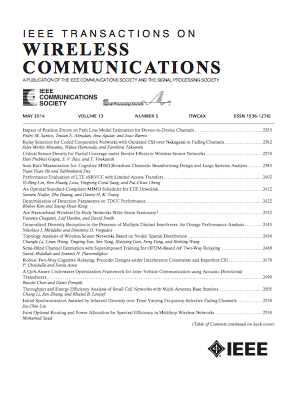异步 ISAC 系统中被动传感的性能界限
IF 8.9
1区 计算机科学
Q1 ENGINEERING, ELECTRICAL & ELECTRONIC
引用次数: 0
摘要
在发射器和接收器时钟不同步的综合传感与通信(ISAC)系统中进行传感是一项重大挑战。了解此类设置中传感性能的基本极限至关重要,而这些极限在很大程度上仍是未知的。本文研究了时钟不同步情况下的传感性能极限。在单载波和多载波模型中,我们推导出了用于估计动态信道路径参数(包括到达角、延迟和复增益序列 (CGS))的克拉梅尔-拉奥边界 (CRB)。通过数学分析和数值模拟,我们全面研究了这些边界如何取决于各种系统参数以及时钟异步的影响。我们的研究结果凸显了时钟异步导致的参数估计性能下降,并揭示了在强视距场景下 CGS 估计的低精度区域。此外,我们还观察到随着带宽增大,性能下降也会逐渐缓解,这为系统设计和优化提供了宝贵的启示。本文章由计算机程序翻译,如有差异,请以英文原文为准。
Performance Bounds for Passive Sensing in Asynchronous ISAC Systems
Sensing in Integrated Sensing and Communications (ISAC) systems with clock asynchronism between the transmitter and receiver poses significant challenges. Understanding the fundamental limits of sensing performance in such setups, which remain largely unknown, is crucial. This paper investigates the sensing performance bounds in the presence of clock asynchronism. In both single-carrier and multi-carrier models, we derive the Cramér-Rao bounds (CRB) for estimating dynamic channel path parameters including angle of arrival, delay, and complex gain sequence (CGS). Through mathematical analyses and numerical simulations, we conduct a comprehensive study on how these bounds depend on various system parameters and the impact of clock asynchronism. Our findings highlight the degradation of parameter estimation performance due to clock asynchronism and reveal low-accuracy zones for CGS estimation in strong-line-of-sight scenarios. Additionally, we observe asymptotic mitigation in performance degradation with larger bandwidth, providing valuable insights for system design and optimization.
求助全文
通过发布文献求助,成功后即可免费获取论文全文。
去求助
来源期刊
CiteScore
18.60
自引率
10.60%
发文量
708
审稿时长
5.6 months
期刊介绍:
The IEEE Transactions on Wireless Communications is a prestigious publication that showcases cutting-edge advancements in wireless communications. It welcomes both theoretical and practical contributions in various areas. The scope of the Transactions encompasses a wide range of topics, including modulation and coding, detection and estimation, propagation and channel characterization, and diversity techniques. The journal also emphasizes the physical and link layer communication aspects of network architectures and protocols.
The journal is open to papers on specific topics or non-traditional topics related to specific application areas. This includes simulation tools and methodologies, orthogonal frequency division multiplexing, MIMO systems, and wireless over optical technologies.
Overall, the IEEE Transactions on Wireless Communications serves as a platform for high-quality manuscripts that push the boundaries of wireless communications and contribute to advancements in the field.

 求助内容:
求助内容: 应助结果提醒方式:
应助结果提醒方式:


